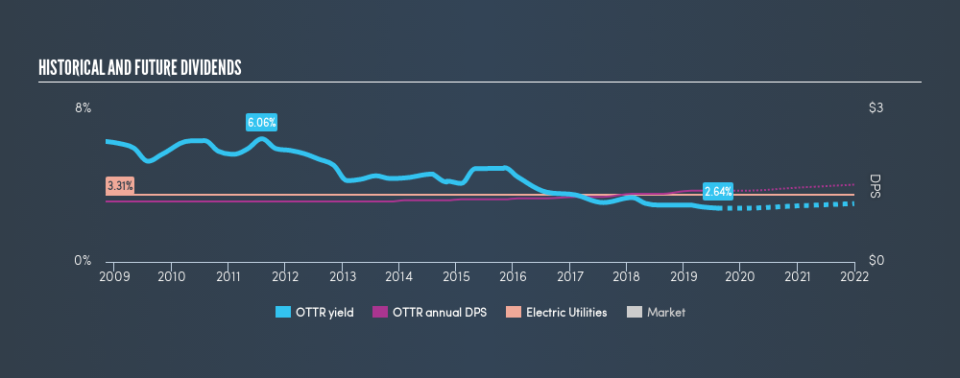Income Investors Should Know That Otter Tail Corporation (NASDAQ:OTTR) Goes Ex-Dividend Soon

Otter Tail Corporation (NASDAQ:OTTR) is about to trade ex-dividend in the next 4 days. You can purchase shares before the 14th of August in order to receive the dividend, which the company will pay on the 10th of September.
Otter Tail's next dividend payment will be US$0.35 per share, and in the last 12 months, the company paid a total of US$1.40 per share. Last year's total dividend payments show that Otter Tail has a trailing yield of 2.6% on the current share price of $52.99. If you buy this business for its dividend, you should have an idea of whether Otter Tail's dividend is reliable and sustainable. So we need to check whether the dividend payments are covered, and if earnings are growing.
View our latest analysis for Otter Tail
If a company pays out more in dividends than it earned, then the dividend might become unsustainable - hardly an ideal situation. Otter Tail paid out 69% of its earnings to investors last year, a normal payout level for most businesses. That said, even highly profitable companies sometimes might not generate enough cash to pay the dividend, which is why we should always check if the dividend is covered by cash flow. Over the past year it paid out 111% of its free cash flow as dividends, which is uncomfortably high. We're curious about why the company paid out more cash than it generated last year, since this can be one of the early signs that a dividend may be unsustainable.
While Otter Tail's dividends were covered by the company's reported profits, cash is somewhat more important, so it's not great to see that the company didn't generate enough cash to pay its dividend. Cash is king, as they say, and were Otter Tail to repeatedly pay dividends that aren't well covered by cashflow, we would consider this a warning sign.
Click here to see the company's payout ratio, plus analyst estimates of its future dividends.
Have Earnings And Dividends Been Growing?
Businesses with strong growth prospects usually make the best dividend payers, because it's easier to grow dividends when earnings per share are improving. Investors love dividends, so if earnings fall and the dividend is reduced, expect a stock to be sold off heavily at the same time. This is why it's a relief to see Otter Tail earnings per share are up 8.5% per annum over the last five years. Earnings have been growing at a steady rate, but we're concerned dividend payments consumed most of the company's cash flow over the past year.
The main way most investors will assess a company's dividend prospects is by checking the historical rate of dividend growth. Otter Tail has delivered an average of 1.6% per year annual increase in its dividend, based on the past 10 years of dividend payments.
To Sum It Up
Should investors buy Otter Tail for the upcoming dividend? Otter Tail is paying out a reasonable percentage of its income and an uncomfortably high 111% of its cash flow as dividends. At least earnings per share have been growing steadily. It's not an attractive combination from a dividend perspective, and we're inclined to pass on this one for the time being.
Ever wonder what the future holds for Otter Tail? See what the two analysts we track are forecasting, with this visualisation of its historical and future estimated earnings and cash flow
If you're in the market for dividend stocks, we recommend checking our list of top dividend stocks with a greater than 2% yield and an upcoming dividend.
We aim to bring you long-term focused research analysis driven by fundamental data. Note that our analysis may not factor in the latest price-sensitive company announcements or qualitative material.
If you spot an error that warrants correction, please contact the editor at editorial-team@simplywallst.com. This article by Simply Wall St is general in nature. It does not constitute a recommendation to buy or sell any stock, and does not take account of your objectives, or your financial situation. Simply Wall St has no position in the stocks mentioned. Thank you for reading.

